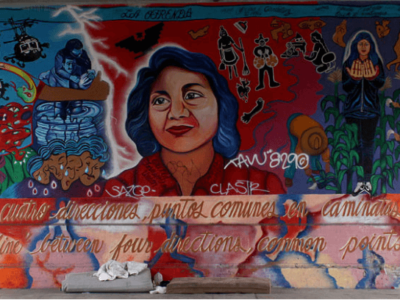Remember the five-minute lecture about the Zoot Suit riots or the high school walkouts you about learned in history class? That’s probably your only connection with learning Chicano/a history or its movement. If you wanted to learn more, that’s where this major comes in clutch. Students will gain perspective on the struggle of being a hyphenated American and how Chicano became a political movement. Because the field of study is so new, students enter an unknown and wide market fresh from graduation. But what kind of world do you enter into with a Chicano and Chicana studies B.A.?
What you’ll be doing
Chicano studies majors learn all about the systematic disadvantages Latinos face and how Chicanos responded and continue to respond to create social change. Precilla Gutierrez, a fourth year at University of California, Los Angeles said, “Chicana/o Studies, like many other majors, is pretty broad. We have 3 caminos, pathways, we can pursue our degree: Expressive Arts, Border and Transnational Studies, History, Literature and Language of the Americas, and Labor, Law and Policy Studies.” You’ll pick up skills for all sorts of jobs. Mari Bejarano fourth-year UCLA student said, “[Students] will know how to communicate across boarder lines and ethnic communities.” In other words? Chicano studies will give students valuable skill sets: the ability to communicate efficiently, bilingualism and inquisitiveness.
The classes you’ll take
Don’t feel like yawning your way through boring lectures? You’ve come to the right place. Students can learn the old language of Nahuatl, and actually put their newfound skill of to use when visiting Mexican ruins like Teotihuacán or in major cities like Veracruz. If learning an old language doesn’t seal the deal, a political struggle course sure will. Bejarano said, “Gabe Johnson’s Political Struggle course [at UCLA] gave me an alternative history than of the standard high school White American history, a history that has never been taught to me before.” Students also go out in the field and help Chicanos in the community, such as helping jornaleros in work centers. Students will discuss Indigenous, Spanish, Mexican, Chicano and other influences and manifestations of this ritual in class discussions.
Internships for this major
Chicano studies majors will go out in the field to make an active difference in underrepresented and underfunded Latino communities by working with politicians and even marginalized communities. “The Soros Justice Fellowship currently accepts applications and works to raise awareness on issues within the criminal justice system, aligns with the social justice aspect of Chicana/o Studies.” Sounds like Chicano studies majors don’t have to worry about not gaining that all-important experience, especially if you want to work in different fields. Students can go into the artistic, creative writing or medical route if politics, history, education or social justice doesn’t sound interesting enough. Getting into these fields requires you to bring the Chicano perspective and insight, and demonstrate how Chicano studies integrates with your field interest.
Career Opportunities
1. Nurse
As a nurse with a background in Chicano studies, you’ll relay vital information to medical professionals about the conditions in Latino healthcare. “My peers who went into the medical field brought a new perspective into the way people have access to health care, a cultural broker, how you communicate someone’s interests into a medical profession,” said Trujillo. Who knew a non-science major could lead to such a cool career?
2. Social Work and Human Resources
The training students undergo in the Chicano studies major prove essential to communicating with families in the welfare system. Bejarano said, “I’m a Latina, I understand the want and need for equality in society.” Social workers work with individuals who rely on government or non-profit resources to survive.
3. Media and Business Networking
The Chicano studies requires you fluently speak English and Spanish, giving the advantage to maneuver in bilingual audiences. Jorge Ramos exemplifies how Latinos with aspirations in media or journalism can crossover into Latino, American and Latino-American media. Chicano studies majors can intern with startups or ad agencies and use social media platforms like Twitter, Facebook, Vine or YouTube to promote their product or message like how the presidential campaigns use targeted ads or memes to communicate with Latino communities.
4. Public Administration
Chicano studies will also give students insight into urban planning, which sounds perfect for those interested in government policy to help improve the designs of Latino communities. Urban planning deals with the development and use of land such as the organization of cities and what deems necessary for the cities space. Believe it, or not, but farmers markets or Whole Foods isn’t as accessible or affordable for Latinos as it is for others.
5. Law
Believe it or not, this major can actually prepare you to become the next Annalise from How to Get Away with Murder, but maybe not as dramatic. Students interested perusing law can look at a case from all angles because Chicano studies students are trained to ask questions of who benefits and why. On the plus side, having built your case by questioning every possible solution will make your argument during trial more persuasive.
Reviews
1. “[One] of the things we emphasize in Chicano studies is to look at the way people tell history and who benefits from how the history is told. Presenting alternate stories and narratives in American history interests people because in K-12, we get a Eurocentric, patriarchy, homonormative history… Students are concerned the major will not train them for a job after and I disagree because you become a problem solver and ask the right questions and find the solution to said questions.” –Ester N. Trujillo UC Santa Barbara Ph.D candidate
2. “[Embrace] the ambiguity of the discipline and push the boundaries of traditional knowledge. In addition, students should be excited to be a part of this major where professors give a great importance to teaching as well as the development of Chicanx students critical thinking skills that are encouraged to be utilized inside as well as outside the classroom.” – Alejandro Prado UC Santa Barbara Ph. D Candidate
3. “Students entering the major should understand that Chicana/o Studies is a lot more than getting to ‘know their history’ or the history of Chicanas/os. It is about learning how power works, and in the process, obtaining the tools to transform our society into a less violent and more livable world. These are tools that can be carried into any career path they choose…Beyond the interpersonal level, students can also create structural changes through engagement with social movements that speak to their concerns and passions. Transformative changes comes through community.” –Martha D. Escobar, Ph.D., Assistant Professor, Department of Chicana/o Studies, California State University, Northridge



















